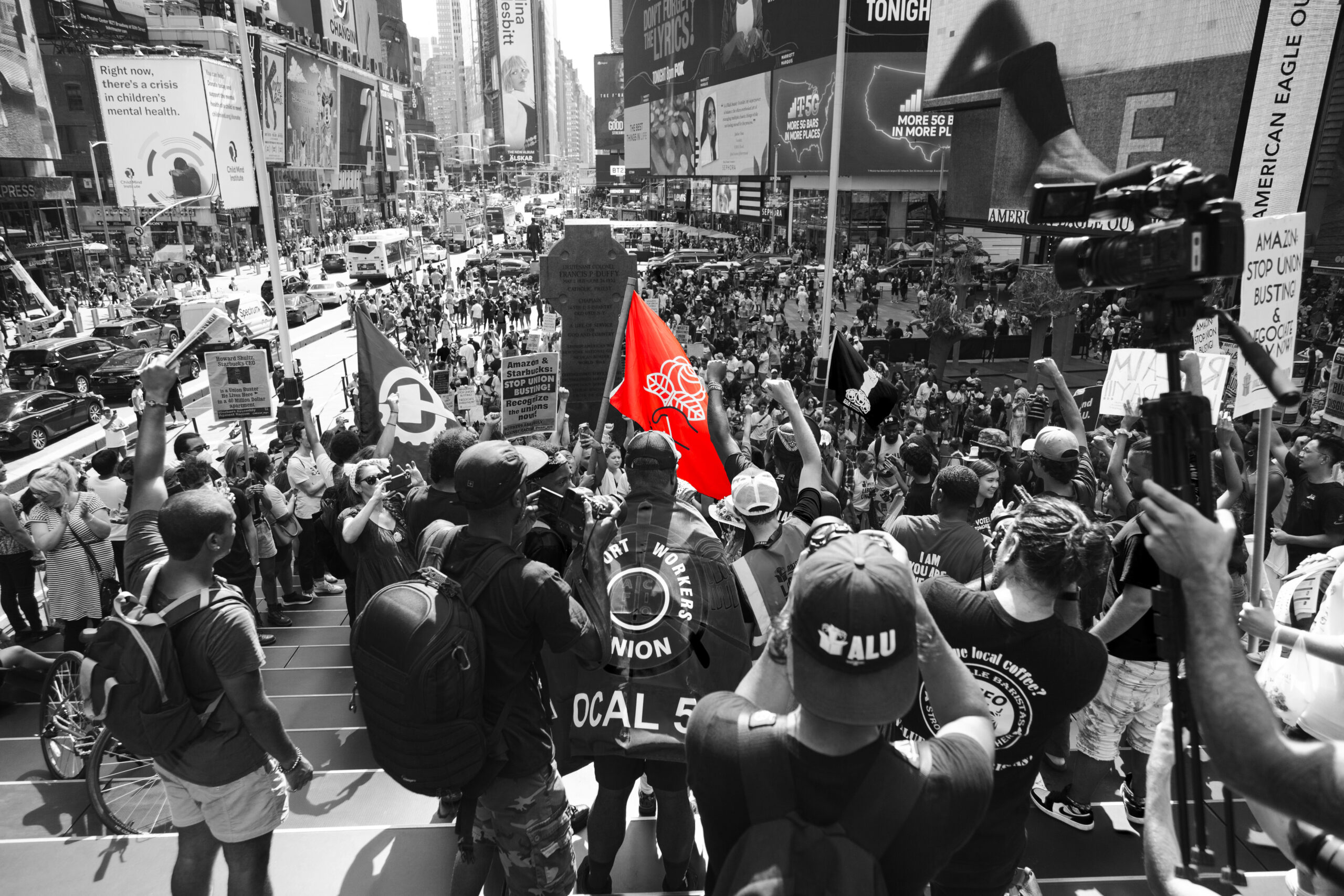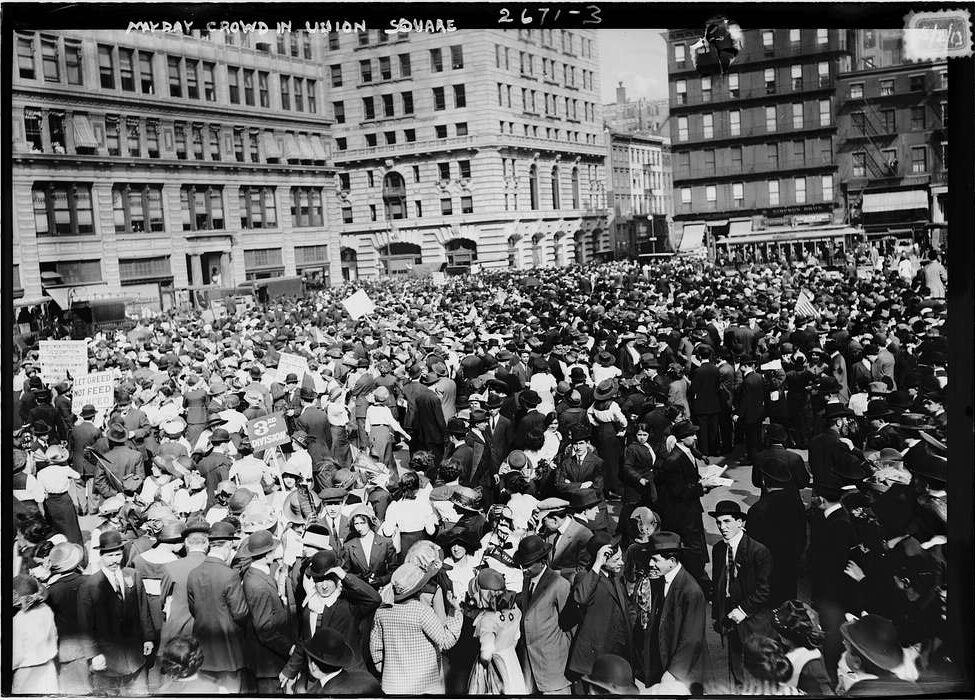Spring 2024
May Day Edition
The new editorial board of Socialist Forum welcomes you to our May issue, where we explore the significance of May Day, a day that encompasses both the arrival of spring and International Workers Day. May Day serves as a reminder of the ongoing struggle for fair wages, safe working conditions, and democracy for all. This May Day, we’re inspired by the thousands of people at the Labor Notes conference who are thinking of more militant approaches to the problems of late capitalism and the thousands of students who have put their education on the line to demand a ceasefire in Gaza.
This issue begins with Gaza. We talked to Erin Lawson, a recent NYU graduate and current member of the YDSA National Coordinating Committee. She recounts her involvement in NYU’s Gaza encampment, the broader NYC student movement, and where it might go from here.
Paul Garver discusses DSA’s involvement in the labor movement and the efforts our organization has made to connect with and support workers internationally. He also talks about the importance of the holiday as a global holiday for solidarity and coming together.
Socialist Forum’s managing editor, Chris Maisano, explores the current state of the labor movement in the US, contrasting it with previous periods of more successful union activity. He argues that labor’s current challenges include low membership, a lack of growth, as well as the absence of the political and social factors that fueled previous waves of unionization. Though the labor movement may not see another dramatic surge in union organizing like in the 1930s, still, Maisano believes there is room for growth.
Socialist Forum editorial board member Todd Chretien reviews the history of mass strikes in the US, highlighting the state and employer violence the strikers often faced. Chretien examines the barriers the labor movement faces to mass striking, including the need to build solidarity and set unifying strategic goals in light of UAW President Shawn Fain’s call for a 2028 general strike.
Turning our attention to the upcoming presidential election, Sarah Hurd, co-chair for DSA’s National Labor Commission, reports on conversations between DSA union activists as they prepare for a challenging presidential election cycle.
Expanding our traditional understanding of labor, Caleb Sneeden lays out a new “politics of care,” which breaks down how and why our society undervalues care work. Care work, which includes healthcare, disability assistance, child and family care, social reproduction, education, and domestic work, is disproportionately handled by marginalized communities. Traditional conceptions of care prioritize a hierarchy between physicians and nurses, with many care workers underpaid and overworked. The pandemic has highlighted the need for a more equitable system that acknowledges the intersectionality of race, class, and gender, and goes beyond repressive capitalist approaches to care.
Bringing the labor movement home, Don and Dominic Driscoll discuss their roots in DSA as a father and son team. Don, who has been a member since 1983, grew up in a red household and was taught values such as love, equality, and a sense of responsibility. His son, Dominic, joined DSA at 18, after witnessing the atrocities of late capitalism. They discuss what the organization can do to improve participation, democracy, membership, and build a mass party.
Turning to political theory in the socialist movement, Harlei Morency and Luke Pickrell advocate a return to democratic republicanism, outlining its historical context and subsequent abandonment by Marxists. To establish a new democratic constitution, the left must refocus on agitating for a working-class-led government, and bold measures like a constitutional convention and the abolition of the Supreme Court, Senate, and Electoral College.
Finally, Sam Lewis ponders the role of paid political leadership in DSA, and the delicate balance between maintaining grassroots democracy and incorporating paid staff. He considers the need for guidelines, consistent policies, and preserving the dynamic member democracy that makes DSA so great.
As always, we welcome your feedback at socialistforum[at]dsausa.org.
Articles
-
Students Stand Up for Gaza
Socialist Forum Editorial Board
Tens of thousands of university students established encampments on more than 200 campuses across the country in the run up to graduation ceremonies. Our interview with YDSA organizer Erin Lawson from NYU points to the movement’s rapid expansion and the prospects for a revival in the fall semester.
-
Practicing Labor Internationalism in a Time of Crisis
Paul Garver
May Day is an opportunity to reflect on DSA’s involvement in the labor movement and the efforts our organization has made to connect with and support workers internationally. He also talks about the importance of the holiday as a global holiday for solidarity and coming together.
-
What if the “Next Upsurge” Never Comes?
Chris Maisano
Growing labor’s power today will depend on our own dogged efforts against the grain of today’s social and political conditions.
-
Looking Back to Look Forward to 2028
Todd Chretien
A history of general strikes provides valuable lessons as we prepare to meet UAW President Shawn Fain’s call for a general strike in 2028.
-
Perspectives on 2024 and Beyond
Sarah Hurd
DSA should stick to the long-term project of building a fighting labor movement and eventually a political party representing its interests.
-
The Politics of Care
Caleb Sneeden
A politics of care is necessary to address the issues with care work as an often neglected, frequently exploited form of labor.
-
When DSA is a Family Affair
Dominic Driscoll and Don Driscoll
A father and son, both members of DSA, talk about the challenges facing our organization and our movement.
-
The Rediscovery of Democratic Republicanism
Harlei Morency and Luke Pickrell
The history of struggles for a democratic constitution remains relevant because the U.S. was not a democracy in the past and it isn’t now.
-
DSA Needs Rules for Paid Political Leadership
Sam Lewis
Without safeguards, paid political leadership could undermine what it seeks to bolster—member democracy.

